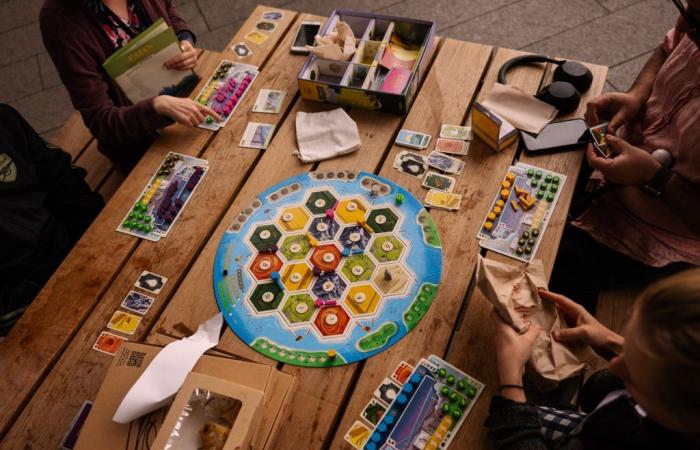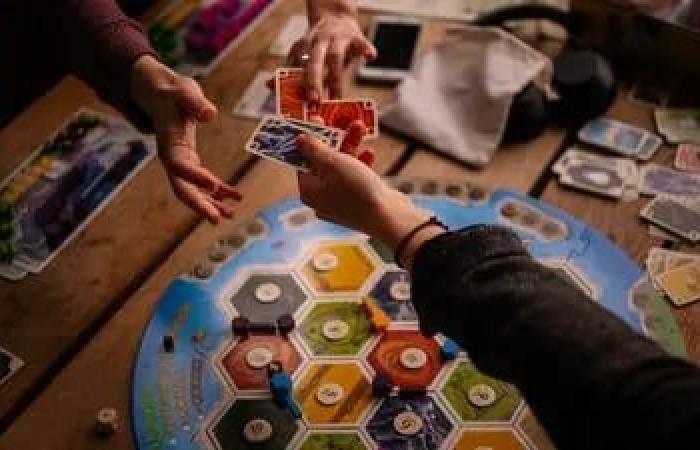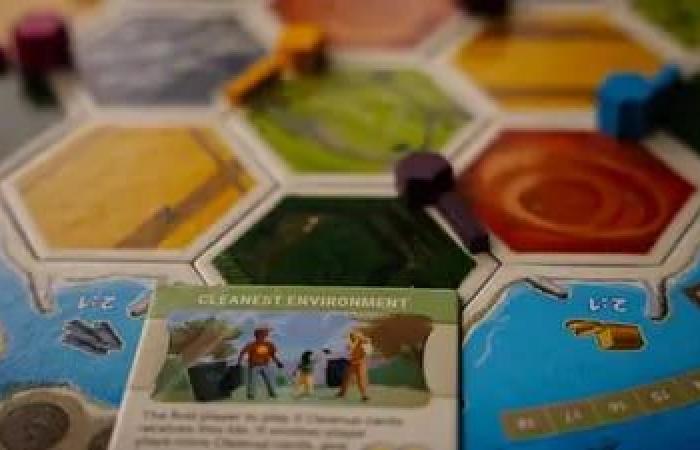Bloomberg — The players of the classic board game Catan are settlers trying to develop an uninhabited island. They must build towns, roads and cities as quickly as possible in a universe in which development and growth are positive and even necessary.
However, a new version of this game, released this week, places players in the 21st century, in which the situation has become more complex.
In this board game the objective is to avoid climate catastropheCatan: New Energies arrives almost thirty years after the debut of the original.(Bloomberg/Jose Sarmento Matos)
In the world of Catan: New Energies (Catan: New Energies), Climate change is already a real threat.
Read More: The popularity of superyachts is growing, but so is their enormous climate impact
Players build towns, cities and roads, trade raw materials such as steel and fabric, and build power plants. At the heart of the decision is whether to continue with fossil fuels and urban development, which can lead to disaster, or invest in renewable energy, an expensive and slow process that lengthens the game and allows other paths to victory.
“I was fascinated by the very, very, very competitive rounds of fossil fuel use, and we all wanted to win,” he says. Benjamin TeuberNew Energies game designer and son of the inventor of Catan, Klaus Teuber. According to Teuber, during rehearsals, the participants tended to start the game aggressively: “Whenever we played, we destroyed the world.”
New Energies was the last game Teuber worked on with his father, died last year. During development, the duo wanted to ensure that the game featured both positive and negative potential outcomes.
For example, it can end prematurely if players continually opt for resource-intensive activities such as building cities and towns. At that point, the player with the highest ratio of renewable energy plants to fossil fuel plants wins. While other players can try to avoid a premature end by building more renewable energy and eliminating fossil fuel plants.
In a parallel to real life, juicing often becomes an exercise inbrinkmanship” (risky policies).
No one wants to reduce their chances of winning by building, or waiting to build, more expensive renewable energy instead of fossil fuels. But more fossil fuels, and more development of cities and towns, means that all players are more likely to trigger events such as flooding and air pollution.
Such developments hamper development, making cheaper fossil fuels even more attractive. It’s a snowball effect that can quickly get out of control.
Read more: Climate change doubled likelihood of deadly floods in Brazil, study finds
When testing the New Energies game, the players felt tormented because of indecision. Building fossil fuel plants is easy and makes more sense as a strategy to propel a player toward victory, but it feels morally wrong. In the end, everyone built at least once, although the player who won had a mix of renewables and fossil fuels.
Teuber says this balance was reflected in his own experience. The game eventually transformed from a race to build as much fossil fuel infrastructure as possible to a group consensus around the shift to at least some renewable energy.
“We said to ourselves: ‘Why did we do that again? Well because it is something innate. We want to win,” she states. “It sucks because the game stopped too early again, and you know, next time maybe we should start earlier with the [energía] green”.
New Energies lays bare the complexity of solving climate change, says Kelli Schmitz, Director of Brand Development at Catan Studio. “It doesn’t shame you for things you can’t really control, which is great, but it makes you think on a more macro level,” she says. “If I can’t control what kind of power plant is built in the next town over, maybe I should start thinking about the systems that get it there and who you vote for, who you support, what kind of conversations you have with your family and friends. ”.
In this board game the objective is to avoid climate catastropheThis board game reveals how complex solving climate change is and helps you think at a macro level.
Play a game may be more instructive than passive activities such as listening to a lecture or seminar, he says Kris De Meyer, neuroscientist and director of the UCL Climate Action Unit. “Games can induce what is called experiential learning,” he says. This is especially powerful when players have the opportunity to dissect what happened during the game.
This is not the first board game about the weather. The series has included environmental elements in expansion packs such as Crop Trust (Crop Trusts) and Oil Springs (Oil Spring), and other games, such as CO2: Second Chance and Tipping Point (CO2: Second chance), They also gamify the problem of balancing growth and climate impacts.
In cooperative play Daybreak (Sunrise), released last year, players take on the role of large countries or coalitions who are working to abandon an economy based on fossil fuels. He objective is to reach the “reduction”when the concentrations of carbon dioxide in the atmosphere begin to decrease.
Read more: Countries struggle to reach deal on climate finance for poorer nations
“You only win when you have collectively decarbonized until you reach the drawdown (reduction), and it is also completely lost when one of the players is in a state of crisis that has endangered many communities,” he says. Matteo Menapace, co-creator of Daybreak.
“While each player has a lot of individual agency and spends a lot of time dealing with their own internal issues, the reckoning is global.” The game has found relevance in the real world; Menapace and the co-creator Matt Leacock They are going to hold sessions with bankers and meteorologists in the coming weeks.

In this board game the objective is to avoid climate catastropheGames can help us understand better than a lecture or other passive activities, inducing experiential learning.
Laurie Laybourn Associate member of the Center for Environment and Society at the Chatham House think tank, says that playing Daybreak with climate policymakers highlights the unpredictability of climate impacts.
“Games are a great way to help these people, and society in general, challenge their imagination with something that has never happened before,” says Laybourn, who advised to Leacock and Menapace in some aspects from Daybreak. “The things that could happen if we don’t address climate change are literally unimaginable, because we haven’t lived them.”
Solutions can also be difficult to imagine, at least as tangible options. That’s one of the reasons Catan: New Energies isn’t called something like Catan: Climate Disaster. “We wanted it to be positive and forward-thinking,” says Schmitz, “leaving this space for hope.”
Read more at Bloomberg.com








